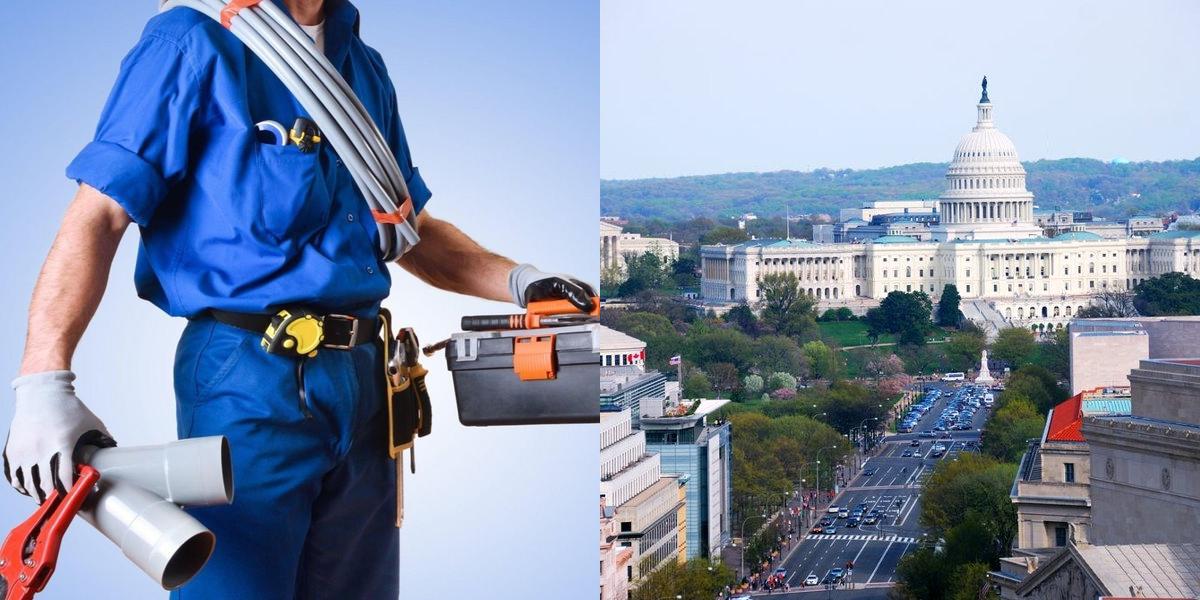How to Become a Plumber in District of Columbia

Want personalized recommendations?
Let's match you to the right program

Plumbers are skilled professionals who specialize in installing, repairing, and maintaining plumbing systems. They work with pipes, fixtures, and other plumbing equipment to ensure the proper functioning of water supply and drainage systems. Here are the key points to consider if you're interested in becoming a plumber in the District of Columbia:
Article continues after recommendations
Recommended for you
What is a Plumber?
Plumbers are responsible for a range of tasks related to plumbing systems. Some of their main responsibilities include:
- Installing and repairing pipes, fixtures, and appliances such as toilets, sinks, and water heaters.
- Inspecting plumbing systems to identify issues and determine the best course of action.
- Reading blueprints and specifications to plan the layout of plumbing systems.
- Collaborating with other professionals, such as electricians and construction workers, to ensure the smooth integration of plumbing systems into buildings.
- Adhering to building codes and regulations to ensure the safety and efficiency of plumbing installations.
Where does a Plumber work?
Plumbers can find employment in various settings, including:
- Residential properties: Many plumbers work in homes, performing repairs, installations, and maintenance tasks.
- Commercial buildings: Plumbers are often hired to work on plumbing systems in office buildings, shopping centers, and other commercial establishments.
- Industrial settings: Some plumbers specialize in industrial plumbing, working in factories and manufacturing plants.
- Construction sites: Plumbers play a vital role in the construction industry, installing plumbing systems in new buildings.
How to Become a Plumber in District of Columbia?
To become a plumber in District of Columbia, one must first complete a state-approved plumbing education program, which typically involves classroom instruction and hands-on training. Next, they must obtain a plumbing license by passing the required exams. Once licensed, they can search for plumbing jobs to start earning a competitive salary.
Requirements to Become a Plumber in District of Columbia
To become a plumber in the District of Columbia, you will need to fulfill certain education and legal requirements. These include:
- Education: While a high school diploma or equivalent is the minimum educational requirement, it is beneficial to pursue vocational training in plumbing. These programs provide hands-on training and cover topics such as pipefitting, blueprint reading, and plumbing codes.
- Apprenticeship: Completing an apprenticeship is a common path to becoming a licensed plumber. Apprenticeships typically last around four to five years and involve a combination of on-the-job training and classroom instruction.
- Licensing: In the District of Columbia, plumbers are required to obtain a license. To qualify for a license, you must complete an approved apprenticeship program and pass a licensing exam. The exam tests your knowledge of plumbing codes and regulations.
Where can I find Plumber classes in District of Columbia?
If you're interested in pursuing a career in plumbing, Dreambound can help you find the right classes near you. Dreambound is the largest platform for students to find and compare vocational training programs. They offer a wide range of plumbing courses in the District of Columbia, providing you with the necessary skills and knowledge to become a successful plumber.
To explore plumbing classes in the District of Columbia and find the perfect program for you, visit Dreambound today.
Exploring a Career in Plumber Outside District of Columbia
For anyone looking to become a Plumber but is in a different state, your opportunity to work as a Plumber might be found in Arkansas, Louisiana, North Carolina, Oregon, or Wyoming. Should these not be viable options, Dreambound eases the process of discovering and comparing Plumber classes with a search by zip code. With the drive to succeed and the support of resources like Dreambound, anyone can forge a successful path in trade, construction, and industry, no matter where they are.
Get courses selected just for you
Try our powerful search engine
Article continues after recommendations
More recommendations for you
How do I get my Plumber certification?
If you have a passion for fixing things, enjoy working with your hands, and have a knack for problem-solving, a career as a plumber might be the perfect fit for you. Plumbers are in high demand and can earn a good income, making it an attractive career choice for many.
To become a certified plumber, you will need to complete a combination of education, apprenticeship, and licensure requirements. Here are the steps you need to take to get your plumber certification:
-
Research the Requirements: Start by researching the specific requirements for becoming a plumber in your state or region. Each state has its own licensing requirements, so it's important to familiarize yourself with the regulations in your area. In addition to state requirements, some cities or municipalities may have additional requirements.
-
Education and Training: The first step in becoming a plumber is to complete a plumbing education program. These programs are typically offered at trade schools, community colleges, or vocational schools. Look for programs that are accredited by a recognized plumbing association or organization. The education program will provide you with the necessary knowledge and skills to work as a plumber.
-
Apprenticeship: After completing your education, you will need to gain practical, hands-on experience by working as an apprentice. An apprenticeship is a combination of on-the-job training and classroom instruction. During your apprenticeship, you will work under the supervision of an experienced plumber, learning the skills and techniques of the trade. Apprenticeships typically last for 4-5 years.
-
Licensure: Once you have completed your education and apprenticeship, you will need to obtain a plumbing license. The requirements for licensure vary by state but generally include passing an exam and completing a certain number of hours of practical experience. Some states also require plumbers to pass a background check and provide proof of insurance.
-
Continuing Education: After obtaining your plumbing license, it's important to stay up-to-date with the latest industry trends and technologies. Many states require licensed plumbers to complete a certain number of continuing education hours each year to maintain their license. This ensures that plumbers are knowledgeable about the latest codes, regulations, and best practices in the industry.
How do I get a job as a Plumber?
After obtaining your plumber certification, the next step is to find a job as a plumber. Here are some steps you can take to increase your chances of landing a job in the plumbing industry:
-
Build a Strong Resume: Start by creating a professional resume that highlights your education, apprenticeship experience, and any relevant skills or certifications. Be sure to include any specialized training or areas of expertise, such as working with specific types of plumbing systems or equipment.
-
Network: Networking is an important part of finding a job in any industry, and plumbing is no exception. Reach out to friends, family members, and acquaintances who may have connections in the plumbing industry. Attend trade shows, industry events, and job fairs to meet professionals in the field and learn about job opportunities.
-
Apply for Apprenticeships: Many plumbing companies offer apprenticeship programs for aspiring plumbers. These programs provide on-the-job training and allow you to earn a salary while learning the trade. Look for companies in your area that offer apprenticeship programs and submit your application.
-
Apply for Jobs: In addition to apprenticeships, there are also job opportunities for licensed plumbers. Look for job openings at plumbing companies, construction firms, government agencies, and other organizations that hire plumbers. Use online job boards, company websites, and trade publications to search for job openings.
-
Prepare for Interviews: Once you start getting calls for interviews, it's important to be prepared. Research the company beforehand, practice common interview questions, and be ready to discuss your education, experience, and skills. Highlight any relevant projects or accomplishments that demonstrate your abilities as a plumber.
-
Gain Experience: If you're having trouble finding a job as a plumber right away, consider gaining additional experience through volunteer work or internships. This will not only help you build your skills and knowledge but also provide you with valuable references and connections in the industry.
Career Paths and Opportunities after Becoming a Plumber
Becoming a plumber opens up a variety of career paths and opportunities. Here are some potential career paths you can explore after becoming a certified plumber:
-
Residential Plumber: Many plumbers start their careers working in residential settings, installing and repairing plumbing systems in homes and apartments. Residential plumbers may work for plumbing companies or start their own business.
-
Commercial Plumber: Commercial plumbers work on larger-scale projects, such as office buildings, shopping centers, and schools. They may be responsible for installing and maintaining plumbing systems in commercial properties.
-
Industrial Plumber: Industrial plumbers work in industrial settings, such as factories, power plants, and manufacturing facilities. They may be involved in installing, repairing, and maintaining plumbing systems that are specific to industrial environments.
-
Pipefitter: Some plumbers specialize in pipefitting, which involves installing and repairing pipes that transport gases, liquids, and chemicals. Pipefitters may work in a variety of industries, including construction, manufacturing, and oil and gas.
-
Fire Sprinkler Fitter: Fire sprinkler fitters specialize in installing and maintaining fire suppression systems, including sprinkler systems. They ensure that these systems are properly installed and functioning correctly to protect buildings in the event of a fire.
-
Plumbing Inspector: If you have extensive experience and knowledge in the plumbing industry, you may consider becoming a plumbing inspector. Plumbing inspectors review plans, inspect plumbing installations, and ensure that they meet building codes and regulations.
-
Entrepreneurship: Many plumbers eventually start their own plumbing businesses. This allows them to have more control over their work and potentially earn a higher income. Starting a plumbing business involves not only the technical skills but also the ability to manage a business, market services, and handle administrative tasks.
Conclusion
Becoming a certified plumber offers a rewarding and stable career. By completing the necessary education, apprenticeship, and licensure requirements, you can start working as a plumber and gain valuable experience in the field. Whether you choose to work in residential, commercial, industrial, or specialized plumbing, there are plenty of opportunities to grow and advance in your career. So, if you have a passion for problem-solving, a knack for fixing things, and enjoy working with your hands, a career as a plumber may be the right path for you.
If you're someone who values exploring multiple career options and wants to find the best match for your interests, feel free to check out these additional articles:

Pia Yapjoco is part of the school growth and sales team at Dreambound. She helps facilitate school partnerships that expand educational opportunities for aspiring students in allied health and other trades. Beyond work, she curates her pup's Instagram, hunts for hidden coffee gems, and escapes into cozy gaming.




